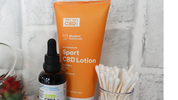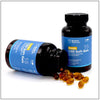Psychologist-Recommended Tips for Reducing Anxiety

Anxiety creeps up at the worst times. Sometimes you’re moving through your day with ease, and suddenly that cloud of doom and gloom appears, making you panic about things you weren’t even thinking about before. You might feel like you’re the only one going through this - but according to the Anxiety and Depression Association of America, 40 million American adults are affected by anxiety every year.
We know that dealing with anxiety is something that many American adults have in common, but what can we do to cope with or get rid of it? Since the pandemic began, psychologists have begun sharing more tips about how to battle anxiety and take care of our mental health. We have collected some of the best advice to help you take back your peace of mind.
Limit caffeine and alcohol
Both caffeine and alcohol can induce anxiety and panic attacks. Try swapping coffee for a green or herbal tea. Chamomile tea is also beneficial for calming the nervous system when you are feeling anxious.
Take time for yourself
Practice self-care in whatever way feels best for you. Express yourself creatively, read a book, go outdoors, or relax by the pool. Don’t feel guilty for taking time to feel better.
Learn what triggers your anxiety
Paying attention to your triggers makes it a lot easier to avoid situations that cause anxiety. When you feel anxious or nervous, take note and try to find a solution to avoid that particular situation in the future.
Stay active
Make time for exercise to release those much-needed endorphins! You never finish a run or a workout and think, “Well, I wish I never did that!” For even more fun, take your workout outdoors.
Reach out to someone
Do not be afraid to ask for help. Many statistics show that you are not alone in what you are feeling. Speak to your friends and family to get the support that you need and try to remember that you are not the only one who feels this way. In our anxiety, we often isolate ourselves.
Practicing solitude can be beneficial if it’s what you need, but also try to tell people in your life how you are feeling so that you can receive emotional support.
If you feel you may need access to professional resources, the National Alliance on Mental Illness can help you connect with providers in your area depending on your needs.
Media distancing (COVID related)
This has been particularly effective in reducing anxiety that is stimulated by COVID-19 and other world issues. If you feel anxiety or dread regarding the pandemic or the state of the world, take 1-2 weeks away from media outlets. Stop watching the news, delete your social media apps, and stop reading the news articles on your phone. Hearing about all of the negativity can feel overwhelming, so it’s important to take a step away to decompress.
Mindful breathing
Using meditation or breathwork to fight anxiety is one of the easiest things that you can do for yourself. Deep belly breaths help send signals to your nervous system telling your brain to calm down and stop producing cortisol (stress hormone). This effective method only takes 5-10 minutes and you can do it anywhere.
Refer back to this list if you are feeling overwhelmed or don’t know where to start to help yourself feel better. Always listen to your body and take time away when necessary.
If you aren't sure where to start with a self-care routine, check out our downloadable guide packed with tips, tricks, and resources.









